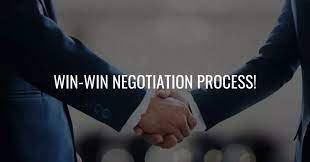
Dear Readers, Today we are going to start our discussion on the 2 Rules that are stated in Terse Negative Terms.
- Never Forget the Power of your Attitude
- Never Judge the Actions and Motives of others
So, Let’s get Started
Never Forget the Power of your AttitudeYou will recall that I said earlier that negotiation, whether at work or at home, is a game — “ Care, but don’t care that much.“
Even if you have just cause to retaliate, restrain yourself. Remember, the provocation act by itself rarely upsets you; rather, it’s view that you take of it that rankles. No one and nothing can irritate you without your consent.
Thomas Jefferson was alluding to this demeanor when he said, “Nothing gives a person so much advantage over another as to remain always cool and unruffled under all circumstances.“
Keep saying to yourself over and over, “It’s a game, It’s the world of Illusion. A tactic perceived is no tactic. I care, but not that much.“
Never Judge the Actions and Motives of OthersSince you cannot look into someone’s heart or mind, it would seem absurd to believe that you might know what impels or propels them. Many times even they don’t know.
Furthermore, should you evaluate the information given to you too soon, the speaker may either wind down or clam up.
For example, a child arrives home one evening and casually remarks to his parents, “Hey, Mom, Dad, you know what? I’ve just been offered a marijuana cigarette!“
“You What?!” the parents shout in unison, startling their child with the vehemence of their response. Unconsciously, the child lurches backward, and a pregnant pause ensures. Now I ask you, how candid and open will this discussion be?
Forget this particular confrontation, what about the future? Will this offspring come back to these parents with more information of this type in the months and years ahead? I doubt it.
Why? Because children are sufficiently bright to know that there’s no percentage in approaching parents with one problem and leaving with 2 problems.
Should you operate this way in your home or at work, you dry up commitment of others becomes greatly impaired.
Perhaps this type of Parental outburst is extreme; yet the same kind of negative judgement is often rendered in more familiar ways by the language we use and the cues that accompany it. To Illustrate:
Example 1
A Parent walks into their child’s room and says, “This place looks like a Pig sty — oink — oink.“
Example 2
A spouse comments to their mate, “You don’t give a damn about me! Can’t you learn how to scrape the food off your plate before you dump it in the sink?“
Example 3
An exasperated parent shouts to their child, “That zoo music you’re blasting on the stereo is so loud, it’s polluting the entire neighborhood.“
Example 4
A negotiator turns to an opponent across the table and remarks, “Your analysis of these data and the way you are figuring the costs are all wrong.“
I should be evident that in all 4 of these examples the speaker is acting out the role of judge. In each instance, an evaluation is being made of another’s lifestyle, values, consideration, integrity, or Intelligence.
By no means am I suggesting that you can transform a member of your family into a visceral opponent with a commonplace harangue.
What I am saying is that such public utterances can offend and do affect face sense.
Moreover, these speech habits are hard to break, and they can carry over to other dealings where trust has not yet been established and the sensitivity is greater.
The elimination of this potential problem is very simple. All that has to be done is the substitution of the word “I” or “Me” you can express your personal feelings, reactions, and needs without sitting in judgement.
Here’s how the 4 examples would read with the incorporation of this simple change:
Example 1
“When this room is not tidy I feel depressed, frustrated, and upset.”
Example 2
“I find that when the food is scraped from the plates it takes me half the time to clean up after a meal. This is Important to me, since I hate washing dishes.”
Example 3
“I am bothered by loud music. I am tired and uptight, and that music is making me irritable.”
Example 4
“I must look at data differently than you. I feel that …”
We have been saying that some opposition is essential because it results in growth and progress. All progress is derived from opponents — those who are dissatisfied with the status quo.
It is these people with their different ideas and ways who generate the required tension that leads to creative solutions and new possibilities — the very foundation of progress.
So, cherish your idea opponents as potential allies. Give them your views with sincerity and persistence, without letting your self-esteem ride on the outcome. Though some tension will of course exist, it should be drained of emotional content so that idea opponents are never transformed in to visceral opponents.
As you have come to share the concepts and ideas presented in this chapter you can see that I am not talking about come-on or con game. In a collaborative Negotiation, there’s no need for conniving, Intimidating, fast talking, Manipulating, Flimflamming, or wheeling and dealing.
On the contrary, I am suggesting a strategy that is oriented toward building and maintaining a continuing relationship. The trusting parties are equals who direct their energies toward solving problems for their mutual benefit.
They create a climate of confidence, where the needs of both sides can be fully satisfied and their positions enhanced.
Well, Readers Next Part we will Discuss about :
“The Compromise Solution“
One thought on “More on the Win-Win Technique | Dealing with Opposition ( Part 5 )”